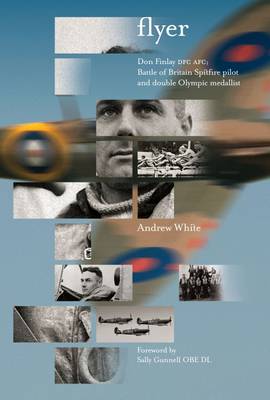
- Retrait gratuit dans votre magasin Club
- 7.000.000 titres dans notre catalogue
- Payer en toute sécurité
- Toujours un magasin près de chez vous
- Retrait gratuit dans votre magasin Club
- 7.000.0000 titres dans notre catalogue
- Payer en toute sécurité
- Toujours un magasin près de chez vous
Flyer
Don Finlay Dfc Afc; Battle of Britain Spitfire Pilot and Double Olympic Medalist
Andrew White
Livre relié | Anglais
34,95 €
+ 69 points
Description
Donald Osborne Finlay, a sporting name familiar to households in the 1930s, was Britain's greatest athlete of the time; a hurdler whose triumphant exploits graced the sports pages and newsreels week after week. From a humble family background, he became a double Olympic medalist, European Champion, and Empire (Commonwealth) Champion; he also won the AAA 120 yards hurdles an unprecedented seven times in succession. Reporters ran out of superlatives to describe him. At the three Olympic Games in which he ran, he captained the British team twice, including the Berlin Games of 1936 in front of Adolf Hitler. An all-round sportsman, both track and field events came naturally to him as did football. He played for the country's top amateur sides and turned out for Tottenham Hotspur in wartime matches.
All the more remarkable is that Finlay competed at the very highest levels of international athletics at the same time as pursuing his demanding career as a Royal Air Force fighter pilot. Joining up as a boy apprentice in the mid-1920s, he qualified as a pilot before the start of the Second World War and found himself in the cockpit of a Supermarine Spitfire, commanding a squadron, during the Battle of Britain. Shot down and wounded in the Battle, he was soon back in the air and rose through the ranks to command a fighter wing in Burma, ending the war with several 'kills' to his name, as well as a Distinguished Flying Cross and an Air Force Cross to add to the medals won under less lethal circumstances on the running track. As a commander, his insistence on strict discipline often led to conflict with his subordinates, but there is no doubt that his methods got results.
After the war, still serving in the RAF, Don returned to competitive athletics and was as fast and successful, if not more so, than ever. By then he was in his 40s, but age was no barrier and several of his greatest hurdling victories came when others would have been long retired from the track, against athletes often twenty years his junior. Don Finlay's life was to end prematurely, and under tragic circumstances, but his legacy lives on as one of the finest athletes ever to wear the vest of Great Britain, as well as one of 'The Few'.
All the more remarkable is that Finlay competed at the very highest levels of international athletics at the same time as pursuing his demanding career as a Royal Air Force fighter pilot. Joining up as a boy apprentice in the mid-1920s, he qualified as a pilot before the start of the Second World War and found himself in the cockpit of a Supermarine Spitfire, commanding a squadron, during the Battle of Britain. Shot down and wounded in the Battle, he was soon back in the air and rose through the ranks to command a fighter wing in Burma, ending the war with several 'kills' to his name, as well as a Distinguished Flying Cross and an Air Force Cross to add to the medals won under less lethal circumstances on the running track. As a commander, his insistence on strict discipline often led to conflict with his subordinates, but there is no doubt that his methods got results.
After the war, still serving in the RAF, Don returned to competitive athletics and was as fast and successful, if not more so, than ever. By then he was in his 40s, but age was no barrier and several of his greatest hurdling victories came when others would have been long retired from the track, against athletes often twenty years his junior. Don Finlay's life was to end prematurely, and under tragic circumstances, but his legacy lives on as one of the finest athletes ever to wear the vest of Great Britain, as well as one of 'The Few'.
Spécifications
Parties prenantes
- Auteur(s) :
- Editeur:
Contenu
- Nombre de pages :
- 224
- Langue:
- Anglais
Caractéristiques
- EAN:
- 9781838068721
- Date de parution :
- 30-09-25
- Format:
- Livre relié
- Format numérique:
- Genaaid
- Dimensions :
- 159 mm x 235 mm
- Poids :
- 616 g

Les avis
Nous publions uniquement les avis qui respectent les conditions requises. Consultez nos conditions pour les avis.






